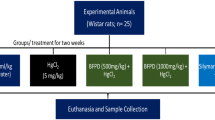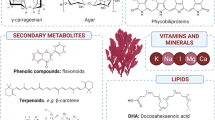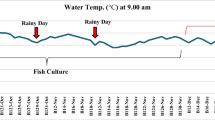Abstract
Acrylamide (ACR), a ubiquitous agent, has various chemical and industrial applications, and it is found in backed or fried carbohydrate-rich food. It has been related to multiple toxicological effects, and it causes high cytotoxicity through oxidative stress. The present study aimed to investigate the potential effect of ACR toxicity administered at different concentrations (5, 10, and 20 mg/L), during 5 days, in order to evaluate the fatty acid (FA) composition and redox state in the digestive gland of Mactra corallina. The results showed, in ACR-treated clams, a significant increase in malondialdehyde, hydrogen peroxide, protein carbonyl, and metallothionein levels, as well as an alteration of the enzymatic (superoxide dismutase, glutathione peroxidase, and catalase) and non-enzymatic (reduced glutathione and ascorbic acid) antioxidant status. However, acetylcholinesterase activity was inhibited in a concentration-dependent manner. In our experiment, the n-3 (Omega-3) and n-6 (Omega-6) polyunsaturated fatty acid levels were significantly changed in all ACR-treated groups. A decrease in eicosapentaenoic acid (C20:5n-3, EPA) and docosahexaenoic acid (C22:6n-3, DHA) was observed in 10-mg/L and 20-mg/L ACR-treated groups. Nevertheless, arachidonic acid (C20:4n-6, ARA) and its precursor linoleic acid (C18:2n-6, LA) were increased. Besides oxidative stress parameters, FA composition may be an additional tool for assessing ACR contamination.


Similar content being viewed by others
References
Abdallah MAM (2013) Bioaccumulation of heavy metals in Mollusca species and assessment of potential risks to human health. Bull Environ Contam Toxicol 90:552–557. https://doi.org/10.1007/s00128-013-0959
Adamsa A, Hamdania S, Van Lanckera F, MeÅLjrib S, De Kimpe N (2010) Stability of acrylamide in model systems and its reactivity with selected nucleophiles. Food Res Int 43:1517–1522. https://doi.org/10.1016/j.foodres.2010.04.033
Aebi H (1984) Catalase in Vitro. Methods Enzym 105:121–126. https://doi.org/10.1016/S0076-6879(84)05016-3
Aprioku JS (2013) Pharmacology of free radicals and the impact of reactive oxygen species on the testis. J Reprod Infertil 14(4):158–172
Arthur JR (2000) The glutathione peroxidases. Cell Mol Life Sci 57:1825–1835. https://doi.org/10.1007/PL00000664
Ayala A, Muñoz MF, Argüelles S (2014) Lipid peroxidation: production, metabolism, and signaling mechanisms of malondialdehyde and 4-hydroxy-2-nonenal. Oxidative Med Cell Longev 2014:31–31. https://doi.org/10.1155/2014/360438
Barber D, Hunt JR, Ehrich M, Lehning EJ, LoPachin RM (2001) Metabolism, toxicokinetics and hemoglobin adduct formation in rats following subacute and subchronic acrylamide dosing. Neurotoxicology 22:341–353. https://doi.org/10.1016/S0161-813X(01)00024-9
Beauchamp C, Fridovich I (1971) Superoxide dismutase: improved assays and an assay applicable to acrylamide gels. Anal Biochem 44:276–277. https://doi.org/10.1016/0003-2697(71)90370-8
Besaratinia A, Pfeifer GP (2007) A review of mechanisms of acrylamide carcinogenicity. Carcinogenesis 28:519–528. https://doi.org/10.1093/carcin/bgm006
Bremner I, Beattie IH (1990) Metallothionein and the trace minerais. Annu Rev Nutr 10:63–83. https://doi.org/10.1146/annurev.nu.10.070190.000431
Bret MT, Müller-Navarra DC (1997) The role of highly unsaturated fatty acids in aquatic food web processes. Freshw Biol 13:1055–1063. https://doi.org/10.1046/j.1365-2427.1997.00220.x
Brown L, Rhead MM, Bancroft KCC, Allen N (1980) Model studies of the degradation of acrylamide monomer. Water Res 14:775–778. https://doi.org/10.1016/0043-1354(80)90254-7
Brown L, Bancroft KCC, Rhead MM (1980b) Laboratory studies on the adsorption of acrylamide monomer by sludge, sediments, clays, peatand synthetic resins. Water Res 14:779–781. https://doi.org/10.1016/0043-1354(80)90255-9
Cai L, Satoh M, Tohyama C, Cherian MG (1999) Metallothionein in radiation exposure: its induction and protective role. Toxicology 132:85–98. https://doi.org/10.1016/S0300-483X(98)00150-4
Calder PC (2005) Polyunsaturated fatty acids and inflammation. Biochem Soc Trans 33(2):423–427. https://doi.org/10.1042/BST0330423
Carere A (2006) Genotoxicity and carcinogenicity of acrylamide a critical review. Ann Ist Super Sanita 42:144–155
Cecchi G, Biasini S, Castano J (1985) Methanolyse rapide des huiles en solvants. Note de laboratoire. Rev Franc Corps Gras 4:163–164
Cherian MG, Jayasurya A, Bay BH (2003) Metallothioneins in human tumors and potential roles in carcinogenesis. Mutat Res 533:201–209. https://doi.org/10.1016/j.mrfmmm.2003.07.013
Chetoui I, Rabeh I, Telahigue K, Ghazali N, Boussoufa D, El Cafsi M (2010) Valorisation de l’apport nutritionnel d’un mollusque bivalve Mactra corallina des côtes tunisiennes (Kalaât El Andalous). Bull Inst Natn Scien Tech Mer de Salmmbô 37:83–88
Da Costa F, Robert R, Quéré C, Wikfors GH, Soudant P (2015) Essential fatty acid assimilation and synthesis in larvae of the bivalve Crassostreagigas. Lipids 50(5):503–511. https://doi.org/10.1007/s11745-015-4006-z
Dickinson DA, Forman HJ (2002) Cellular glutathione and thiols metabolism. Biochem Pharmacol 64:1019–1026. https://doi.org/10.1016/S0006-2952(02)01172-3
Draper HH, Hadley M (1990) Malondialdehyde determination as index of lipid peroxidation. Methods Enzymol 86:421–431. https://doi.org/10.1016/0076-6879(90)86135-I
Dybing E, Farmer PB, Andersen M, Fennell TR, Lalljie SP, Müller DJ, Olin S, Petersen BJ, Schlatter J, Scholz G, Scimeca JA, Slimani N, Törnqvist M, Tuijtelaars S, Verger P (2005) Human exposure and internal dose assessments of acrylamide in food. Food Chem Toxicol 43:365–410. https://doi.org/10.1016/j.fct.2004.11.004
Ellman GL (1959) Tissue sulhydryl groups. Arch Biochem Biophys 82:70–77. https://doi.org/10.1016/0003-9861(59)90090-6
Ellman GL, Courtney KD, Andres V (1961) A new and rapid colorimetric determination of acetylcholinesterase activity. Biochem Pharmacol 7:88–95. https://doi.org/10.1016/0006-2952(61)90145-9
Exon JH (2006) A review of the toxicology of acrylamide. J Toxicol Environ Health 9:397–412. https://doi.org/10.1080/10937400600681430
Faggio C, Tsarpali V, Dailianis S (2018) Mussel digestive gland as a model tissue for assessing xenobiotics: an overview. Sci Total Environ 636:220–229. https://doi.org/10.1016/j.scitotenv.2018.04.264
Fasulo B, Deuring R, Murawska M, Gause M, Dorighi KM, Schaaf CA, Dorsett D, Brehm A, Tamkun JW (2012) The Drosophila Mi-2 chromatin-remodeling factor regulates higher-order chromatin structure and cohesin dynamics in vivo. PLoS Genet 8(8):e1002878. https://doi.org/10.1371/journal.pgen.1002878
Favier A (2003) Stress oxydant. Interetconceptionnel et experimental dans la comprehension des mecanismes des maladies et potentiel therapeutique. L. Actual Chim 11:108–115
Filimonova V, Alves FG, Marques JC, Troch M, Gonçalves AMM (2016) Fatty acid profiling as bioindicator of chemical stress in marine organisms: a review. Ecol Indic 67:657–672. https://doi.org/10.1016/j.ecolind.2016.03.044
Flohe L, Gunzler WA (1984) Assays of gluthathione peroxidase. Methods Enzymol 105:114–121. https://doi.org/10.1016/S0076-6879(84)05015-1
Fokina N, Ruokolainen TR, Nemova NN, Bakhmet IN (2013) Changes of blue mussels Mytilus edulis L. lipid composition under cadmium and copper toxic effect. Biol Trace Elem Res 154(2):217–225. https://doi.org/10.1007/s12011-013-9727-3
Folch J, Lees M, Sloane stanley GH (1957) A simple method for the isolation and purification of total lipides from animal tissues. J Biol Chem 226(1):497–509
Friedman M (2003) Chemistry, biochemistry, and safety of acrylamide. A review. J Agric Food Chem 51:4504–4526. https://doi.org/10.1021/jf030204
Geret F, Serafim A, Barreira L, Bebianno MJ (2002) Response of antioxidant systems to copper in the gills of the clam Ruditapes decussates. Mar Environ Res 54:413–417. https://doi.org/10.1016/S0141-1136(02)00164-2
Ghorbel I, Elwej A, Chaabene M, Boudawara O, Marrakchi R, Jamoussi K, Boudawara TS, Zeghal N (2017) Effects of acrylamide graded doses on metallothioneins I and II induction and DNA fragmentation: Bochemical and histomorphological changes in the liver of adult rats. Toxicol Ind Health 33(8):611–622. https://doi.org/10.1177/0748233717696613
Gonçalves AMM, Barroso DV, Serafim TL, Verdelhos T, Marques JC, Gonçalves F (2017) The biochemical response of two commercial bivalve species to exposure to strong salinity changes illustrated by selected biomarkers. Ecol Indic 76:59–66. https://doi.org/10.1016/j.ecolind.2017.01.020
Guéraud F, Atalay M, Bresgen N, Cipak A, Eckl PM, Huc L, Jouanin I, Siems W, Uchida K (2010) Chemistry and biochemistry of lipid peroxidation products. Free Radic Res 44(10):1098–1124. https://doi.org/10.3109/10715762.2010.498477
Hagmar L, Törnqvist M, Nordander C, Rosén I, Bruze M, Kautiainen A, Magnusson AL, Malmberg B, Aprea P, Granath F, Axmon A (2001) Health effects of occupational exposure to acrylamide using hemoglobin adducts as biomarkers of internal dose. Scand J Work Environ Health 27(4):219–226
Haleng J, Pincemail J, Defraigne JO, Charlier C, Chapelle JP (2007) Oxidative stress. Rev Med Liege 62:628–638
Halliwell B (2007) Biochemistry of oxidative stress. Biochem Soc Trans 35(Pt 5):1147–1150. https://doi.org/10.1042/BST0351147
Jacques-Silva MC, Nogueira CW, Broch LC (2001) Diphenyl diselenide and ascorbic acid changes deposition of selenium and ascorbic acid in liver and brain of mice. Pharmacol Toxicol 88:119–125. https://doi.org/10.1034/j.1600-0773.2001.d01-92.x
Jollow DJ, Mitchell JR, Zampaglione N, Gillette JR (1974) Bromobenzene-induced liver necrosis. Protective role of glutathione and evidence for 3,4-bromobenzene oxide as the hepatotoxic metabolite. Pharmacology 11:151–169. https://doi.org/10.1159/000136485
Kang YJ (2006) Metallothionein redox cycle and function. Exp Biol Med 231:1459–1467. https://doi.org/10.1177/153537020623100903
Kelly JR, Scheibling RE (2012) Fatty acids as dietary tracers in benthic food webs. Mar Ecol Prog Ser 446:1–22. https://doi.org/10.3354/meps09559
Kim SM, Beak JM, Lim SM, Kim JY, Kim J, Choi I, Cho K-H (2015) Modified lipoproteins by acrylamide showed more atherogenic properties and exposure of acrylamide induces acute hyperlipidemia and fatty liver changes in zebrafish. Cardiovasc Toxicol 15:300–308. https://doi.org/10.1007/s12012-014-9294-7
Krautter GR, Mast RW, Alexander HC, Wolf CH, Friedman MA, Koschier FJ, Thompson CM (1986) Acute toxicity tests with acrylamide monomer and macroinvertebrates and fish. Environ Toxicol Chem 5:373–377. https://doi.org/10.1002/etc.5620050406
Krishnan N, Kodrík D, Kłudkiewicz B, Sehnal F (2009) Glutathione-ascorbic acid redox cycle and thioredoxin reductase activity in the digestive tract of Leptinotarsadecemlineata (Say). Insect Biochem Mol Biol 39(3):180–188. https://doi.org/10.1016/j.ibmb.2008.11.001
Kusnin N, Syed MA, Ahmad SA (2015) Toxicity, pollution and biodegradation of acrylamide – a mini review. JOBIMB 3(2):6–12
Larguinho M, Costa PM, Sousa G, Costa MH, Diniz MS, Baptista PV (2013) Histopathological findings on Carassius auratus hepatopancreas upon exposure to acrylamide: correlation with genotoxicity and metabolic alterations. J Appl Toxicol 34(12):1293–1302. https://doi.org/10.1002/jat.2936
Larguinho M, Cordeiro A, Diniz MS, Costa PM, Baptista PV (2014) Metabolic and histopathological alterations in the marine bivalve Mytilus galloprovincialis induced by chronic exposure to acrylamide. Environ Res 135:55–62. https://doi.org/10.1016/j.envres.2014.09.004
Liou GY, Storz P (2010) Reactive oxygen species in cancer. Free Radic Res 44(5):479–496. https://doi.org/10.3109/10715761003667554
Liu JJ, Green P, John Mann J, Rapoport SI, Sublette ME (2015) Pathways of polyunsaturated fatty acid utilization: implications for brain function in neuropsychiatric health and disease. Brain Res 1597:220–246. https://doi.org/10.1016/j.brainres.2014.11.059
LoPachin RM (2004) The changing view of acrylamide neurotoxicity. Neurotoxicology 25:617–630. https://doi.org/10.1016/j.neuro.2004.01.004
LoPachin RM, Barber DS (2006) Synaptic cysteine sulfhydryl groups as targets of electrophilic neurotoxicants. Toxicol Sci 94:240–255. https://doi.org/10.1093/toxsci/kfl066
LoPachin RM, Gavin T (2012) Molecular mechanism of acrylamide neurotoxicity: lessons learned from organic chemistry. Environ Health Perspect 120:1650–1657. https://doi.org/10.1289/ehp.1205432
Lowry OH, Roseborouch NI, Farrand AL, Randall R (1951) Protein measurement with the folin phenol reagent. J Biol Chem:263–275
Merad I, Bellenger S, Hichami A, Khan NA, Soltani N (2017) Effect of cadmium exposure on essential omega-3 fatty acids in the edible bivalve Donax trunculus. Environ Sci Pollut Res 25(2):18242–18250. https://doi.org/10.1007/s11356-017-9031-4
Myagchenkova VA, Kurenkova VF (1991) Applications of acrylamide polymers and copolymers a review. Polym Plast Technol Eng 30:109–135. https://doi.org/10.1080/03602559108020132
NICNAS (2002) Acrylamide: priority existing chemical assessment report no. 23. National Industrial Chemicals Notification and Assessment, Scheme, Sydney https://www.nicnas.gov.au/chemical-information/pec-assessments
Ou P, Wolff SP (1996) A discontinuous method for catalase determination at near physiological concentrations of H2O2 and its application to the study of H2O2 fluxes within cells. J Biochem Biophys Methods 31:59–67. https://doi.org/10.1016/0165-022X(95)00039-T
Petrovic S, Ozretic B, Krajnovic-Ozretic M, Bobinac D (2001) Lysosomal membrane stability and metallothioneins in digestive gland of mussels (Mytilus galloprovincialis Lam.) as biomarkers in afield study. Mar Pollut Bull 42:1373–1378. https://doi.org/10.1016/S0025-326X(01)00167-9
Pradeep AR, Ramchandraprasad MV, Bajaj P, Rao NS, Agarwal E (2013) Protein carbonyl: an oxidative stress marker in gingival crevicular fluid in healthy, gingivitis, and chronic periodontitis subjects. Contemp Clin Dent 4(1):27–31. https://doi.org/10.4103/0976-237X.111589
R Development Core Team (2017) R: A language and environment for statistical computing. R Foundation for Statistical Computing, Vienna ISBN 3-900051-07-0
Rabei A, Hichami A, Beldi H, Bellenger S, Khan NA, Soltani N (2018) Fatty acid composition, enzyme activities and metallothioneins in Donaxtrunculus (Mollusca, Bivalvia) from polluted and reference sites in the Gulf of Annaba (Algeria): pattern of recovery during transplantation. Environ Pollut 237:900–907. https://doi.org/10.1016/j.envpol.2018.01.041
Reznick AZ, Packer L (1994) Oxidative damage to proteins: spectrophotometric method for carbonyl assay. Methods Enzymol 233:357–363. https://doi.org/10.1016/S0076-6879(94)33041-7
Rogacheva SM, Ignatov OV (2001) The respiratory activity of Rhodococcus rhodochrous M8 cells producing nitrile-hydrolyzing enzymes. Appl Biochem Microbiol 37(3):282–286. https://doi.org/10.1023/A:1010285302941
Schmatz R, Mazzanti CM, Spanevello R, Stefanello N, Gutierres J, Corrêa M, da Rosa MM, Rubin MA, ChitolinaSchetinger MR, Morsch VM (2009) Resveratrol prevents memory deficits and the increase in acetylcholinesterase activity in streptozotocin-induced diabetic rats. Eur J Pharmacol 610(1–3):42–48. https://doi.org/10.1016/j.ejphar.2009.03.032
Signa G, Di Leonardo R, Vaccaro A, Tramati CD, Mazzola A, Vizzini S (2015) Lipid and fatty acid biomarkers as proxies for environmental contamination incaged mussels Mytilus galloprovincialis. Ecol Indic 57:384–394. https://doi.org/10.1016/j.ecolind.2015.05.002
Stillwell W, Wassall SR (2003) Docosahexaenoic acid: Membrane properties of a unique fatty acid. Chem Phys Lipids 126:1–27. https://doi.org/10.1016/S0009-3084(03)00101-4
Tamarit J, Cabiscol E, Ros J (1998) Identification of the major oxidatively damaged proteins in Escherichia coli cells exposed to oxidative stress. J Biol Chem 273:3027–3032. https://doi.org/10.1074/jbc.273.5.3027
Tan D, Li L, Wang S, Wei B, Zhang X, Sun B, Ji S (2013) The cytogenetic effects of acrylamide on Carassius auratus periperial blood cells. Food Chem Toxicol 2:318–322. https://doi.org/10.1016/j.fct.2013.08.077
Tareke E, Rydberg P, Karlsson P, Eriksson S, Tornqvist M (2000) Acrylamide: A cooking carcinogen? Chem Res Toxicol 13:517–522. https://doi.org/10.1021/tx9901938
Tareke E, Rydberg P, Karlsson P, Eriksson S, Törnqvist M (2002) Analysis of acrylamide a carcinogen formed in heated foodstuffs. J Agric Food Chem 50:4998–5006. https://doi.org/10.1021/jf020302f
Telahigue K, Rabeh I, Hajji T, Trabelsi W, Bejaoui S, Chouba L, El Cafsi M, Soudani N (2019) Effects of acute mercury exposure on fatty acid composition and oxidative stress biomarkers in Holothuria forskali body wall. Ecotoxicol Environ Saf 169:516–522. https://doi.org/10.1016/j.ecoenv.2018.11.051
Touzé S, Guerin V, Guezennec A-G, Binet S, Togola A (2015) Dissemination of acrylamide monomer from polyacrylamide based flocculant use—sand and gravel quarry case study. ESPR 22(9):6423–6430. https://doi.org/10.1007/s11356-014-3177-0
Vance DE, Vance JE (2002) Biochemistry of lipids, lipoproteins and membranes, 4th edn. Elsevier, Edmonton
Viarengo A, Ponzano E, Dondero F, Fabbri R (1997) A simple spectrophotometric method for metallothionein evaluation in marine organisms: an application to Mediterranean and Antarticmolluscs. Mar Environ Res 44:69–84. https://doi.org/10.1016/S0141-1136(96)00103-1
Waddell WJ, Lech JJ, Marlowe C, Kleinow KM, Friedman MA (1990) The distribution of [14C] acrylamide in rainbow trout studied by whole-body autoradiography. Fundam Appl Toxicol 14:84–87. https://doi.org/10.1093/toxsci/14.1.84
Watzek N, Böhm N, Feld J, Scherbl D, Berger F, Merz KH, Lampen A, Reemtsma T, Tannenbaum SR, Skipper PL, Baum M, Richling E, Eisenbrand G (2012) N7-glycidamide-guanine DNA adduct formation by orally ingested acrylamide in rats a dose–response study encompassing human diet-related exposure levels. Chem Res Toxicol 25:381–390. https://doi.org/10.1021/tx200446z
Weston D, Lentz RD, Cahn MD, Ogle RS, Rothert AK, Lydy MJ (2009) Toxicity of anionic polyacrylamide formulations when used for erosion controlin agriculture. J Environ Qual 38:238–247. https://doi.org/10.2134/jeq2008.0109
Zamora R, Delgado RM, Hidalgo FJ (2010) Model reactions of acrylamide with selected amino compounds. J Agric Food Chem 58:1708–1713. https://doi.org/10.1021/jf903378x
Zhou Z, Sun X, Kang YJ (2002) Metallothionein protection against alcoholic liver injury through inhibition of oxidative stress. Exp Biol Med 227:214–222. https://doi.org/10.1177/153537020222700310
Zhukova NV (1991) The pathway of the biosynthesis of non-methylene-interrupted dienoic fatty acids in molluscs. Comp Biochem Physiol B 100:801–804. https://doi.org/10.1016/0305-0491(91)90293-M
Zorita L, Ortiz-Zarragoitia M, Solo M, Cajaraville MP (2006) Biomarkers in mussels from a copper site gradient (Visnes, Norway): an integrated biochemical, histochemical and histological study. Aquat Toxicol 78:109–116. https://doi.org/10.1016/j.aquatox.2006.02.032
Acknowledgments
We are indebted to the editor and the anonymous reviewers for their acceptance to review this work.
Author information
Authors and Affiliations
Corresponding author
Ethics declarations
Conflict of interest
The authors declare that they have no competing interests.
Additional information
Responsible editor: Cinta Porte
Publisher’s note
Springer Nature remains neutral with regard to jurisdictional claims in published maps and institutional affiliations.
Rights and permissions
About this article
Cite this article
Trabelsi, W., Chetoui, I., Fouzai, C. et al. Redox status and fatty acid composition of Mactra corallina digestive gland following exposure to acrylamide. Environ Sci Pollut Res 26, 22197–22208 (2019). https://doi.org/10.1007/s11356-019-05492-5
Received:
Accepted:
Published:
Issue Date:
DOI: https://doi.org/10.1007/s11356-019-05492-5




